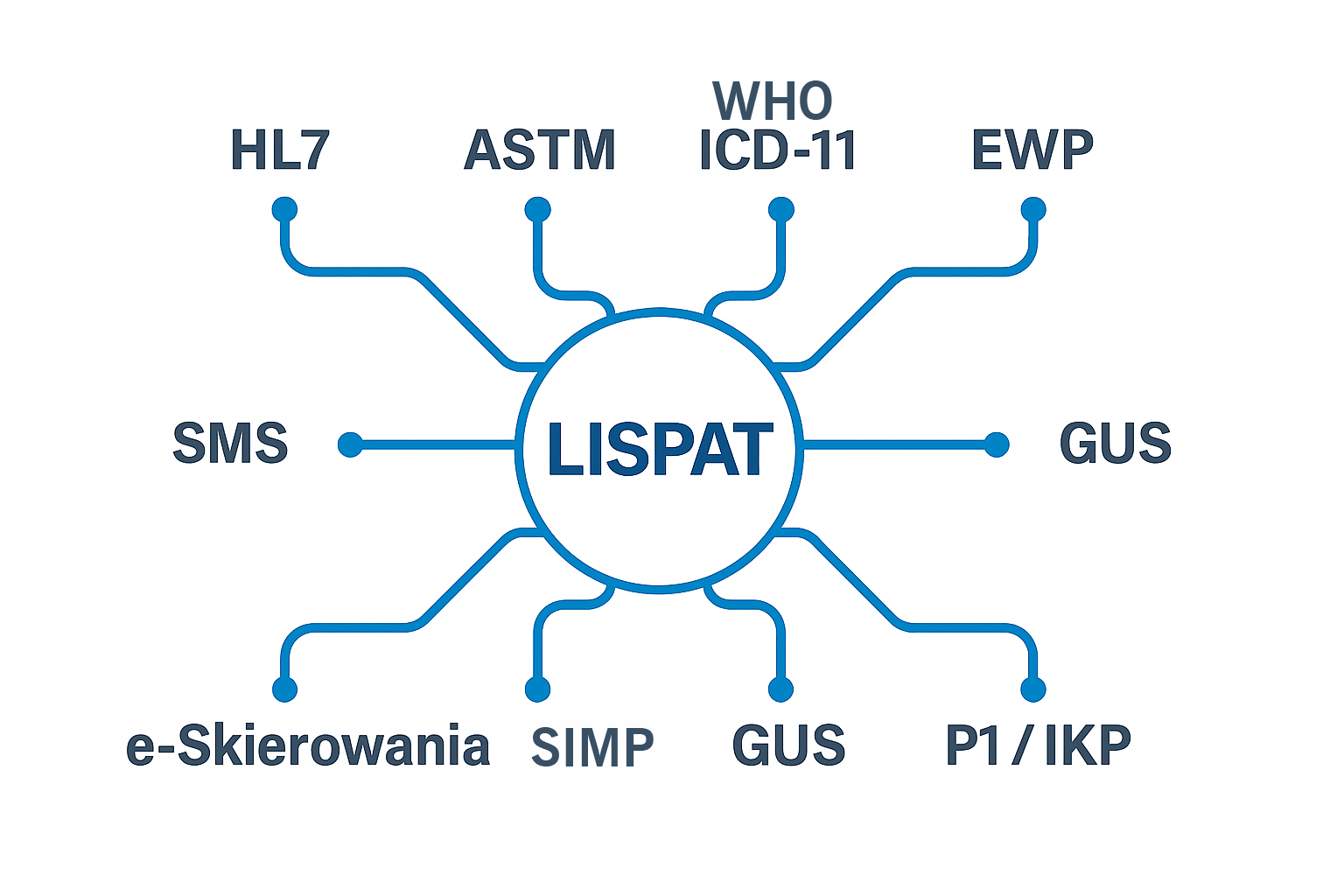Integrations
P1 / IKP Integration
The most important integration from the patient's perspective. LISPAT allows:
- Creation of a medical event in the P1 system (pathology test),
- Indexing of electronic documentation (test result).

HL7 Integration
HL7 integration enables direct data exchange between the pathology lab and its client, e.g., a hospital. When a clinician issues a referral in their HIS, it is automatically sent to LISPAT along with the patient and case data – eliminating manual input and errors.
Conversely, after the result is signed by the pathologist, LISPAT sends it back to the hospital system. The referring physician can access the result almost instantly – no printing needed.
ASTM Integration
ASTM-based integration allows LISPAT to communicate with lab equipment, such as molecular analyzers. Tests can be defined, barcoded labels generated and sent to the device. Once the sample is scanned, LISPAT sends the list of tests to run. After processing, results return to LISPAT automatically – no manual entry required.
e-Referrals (P1) Integration
LISPAT integrates with the P1 platform to support e-Referrals. Entering the referral number is enough – the system fetches the patient and test data automatically. It also returns test status to P1, so the clinical system has real-time updates.
EWP Integration
Thanks to EWP integration, entering a PESEL number during referral registration is enough for LISPAT to fetch the patient’s name automatically. This reduces manual data entry errors significantly.
GUS Integration
When registering new clients (e.g., hospitals, clinics, physicians), LISPAT can fetch full company data from the GUS database using the NIP number. This speeds up registration and ensures data accuracy.
ICD-11 Integration
LISPAT supports the latest version of ICD-11 by connecting directly to WHO servers in Geneva. While ICD-11 is not yet officially adopted in Poland, it is the most precise classification tool globally – allowing for highly specific diagnoses.
Milestone Macropath Integration
Macropath is used for macro photography. Integrated with LISPAT, it automatically captures images (e.g., via foot pedal) and links them to the patient's documentation. Images can be:
- tagged,
- commented,
- printed with the result,
- shared with the client via the WEB module.
mMedica Integration
With integration to mMedica (Asseco), referrals created in mMedica are automatically transferred to LISPAT. Once the test is completed, the result is accessible directly in mMedica – no printing or external tools required.
Patomorfolog System Integration
Although LISPAT is replacing the older Patomorfolog system, some data exchange is still required. LISPAT allows:
- sending referrals to the Patomorfolog system,
- receiving results and saving them automatically in LISPAT.
SIMP Integration
SIMP supports the cervical cancer screening program. Integration includes:
- retrieving the screening questionnaire (e-Referral) from SIMP by exam number,
- sending result packages from LISPAT to SIMP.
SMSAPI Integration
LISPAT uses the SMSAPI platform to send text notifications. Patients can be automatically informed when results are available for download – improving communication and reducing the burden on staff.
TERYT Integration
Polish health fund (NFZ) reporting requires assigning a territorial code (TERYT) to a medical facility. LISPAT can fetch this code automatically from the TERYT system, simplifying reporting and preventing errors.
KSeF Integration
Integration with the National e-Invoice System (KSeF) enables issuing and verifying structured invoices directly in LISPAT — with a single click, without logging into the taxpayer’s portal. The automation minimizes errors, speeds up settlements, and ensures full compliance with the regulations effective from April 1, 2026.